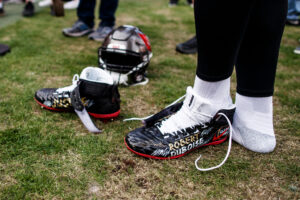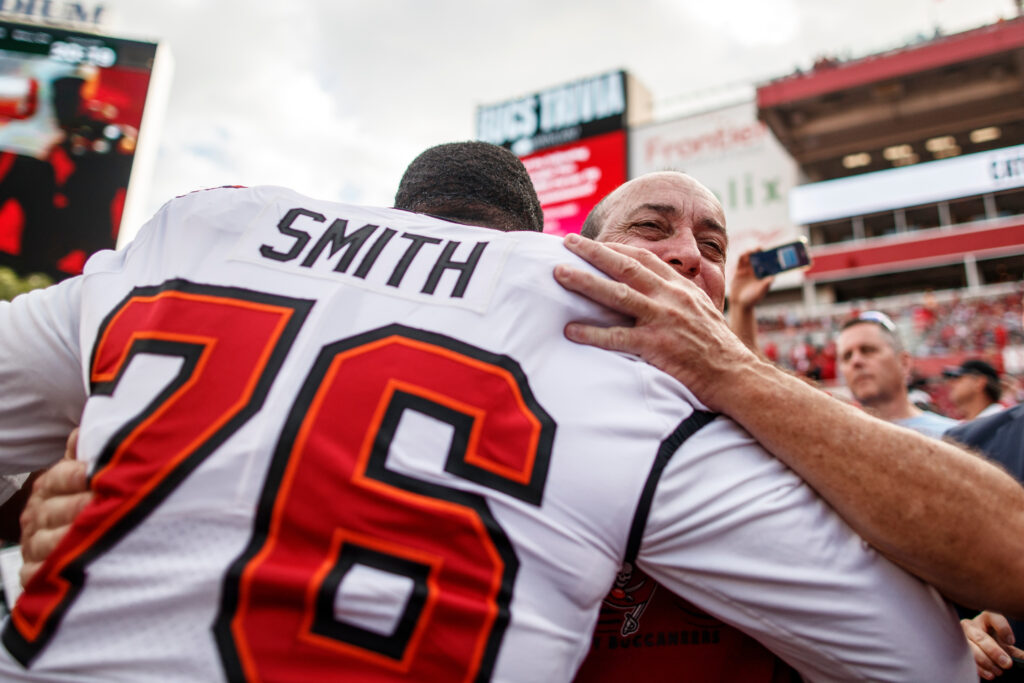Robert DuBoise enjoyed football growing up, but since being freed and exonerated in 2020, has developed a new relationship with the sport and his hometown team, the Tampa Bay Buccaneers.
On Sunday, the team gifted Mr. DuBoise during an ”Inspire Change” game against the Carolina Panthers with a pair of unique cleats inspired by his 37 years of wrongful imprisonment. The cleats, designed as part of the NFL’s “My Cause, My Cleats” campaign, bear Mr. DuBoise’s name and the number of years he spent wrongfully incarcerated. They were presented to Mr. DuBoise by Buccaneers offensive tackle Donovan Smith, who wore them at a practice ahead of the game.
“They really surprised me,” Mr. DuBoise said, adding that he’s a bigger football fan these days than he used to be, particularly of the Bucs. “It’s really cool.”
Such a special moment—thank you to the @Buccaneers for supporting Robert DuBoise & the fight for justice.
Robert spent 37 years in prison for a crime he didn't commit, but Florida's "clean hands ban" means he can't be compensated for his wrongful incarceration.
: @NFLonCBS pic.twitter.com/OfvrmDQAdy
— The Innocence Project (@innocence) January 9, 2022
The cleats are also emblazoned with the phrase “clean hands” struck through by Nike’s signature swoosh, a recognition of the need to eliminate the “clean hands ban” that prevents Mr. DuBoise, and other exonerees, from being compensated for his nearly four decades of wrongful imprisonment. Printed on the shoes is “S.B. 526″ — the Senate bill that could finally change that.
Although Florida does offer compensation to wrongly convicted people, its law sets forth several conditions that make it incredibly difficult, if not impossible, for an exonerated person to actually receive compensation from the state. Since its compensation law was passed in 2008, only a few out of the dozens exonerated have been compensated.

Offensive Tackle Donovan Smith wears custom cleats at a practice before presenting the shoes to exoneree Robert DuBoise, before the game between the Carolina Panthers and Tampa Bay Buccaneers in Tampa, Florida, on Jan. 9, 2022. (Image: Kyle Zedaker/Tampa Bay Buccaneers)
Florida is the only state in the country whose compensation statute includes a “clean hands ban,” which prevents an exonerated person from being compensated if they were previously convicted of certain unrelated crimes. While minor improvements have been made to this requirement, it still bars nine exonerees from being compensated.
Under Florida’s current law, an exonerated person can be compensated if they have one non-violent felony. However, the restrictive policy means that Mr. DuBoise, who was sentenced to probation for minor, non-violent offenses at the age of 17, hasn’t seen a cent for the 37 years he spent in prison — including three years on death row — for a crime he didn’t commit.
The Innocence Project, together with the Innocence Project of Florida, is working to reform the law, which also requires a person to apply for compensation within 90 days of their convictions being vacated. This prohibitively tight deadline prevents many exonerees from being compensated, as many people remain incarcerated for months or even years after their conviction is vacated while prosecutors seek retrials.
Senate Bill 526 and House Bill 241, which would fix both these barriers and finally enable all exonerees to be compensated, are sponsored by Florida House Rep. Traci Koster and State Sen. Keith Perry.
Since being exonerated, Mr. DuBoise has used his voice to support this legislative reform, which would help bring him and his fellow exonerees one step closer to justice in Florida.
“When people read about these cases, sometimes it’s like just another story, but I think it’s different when they meet a person and hear it from them themselves,” Mr. DuBoise said.
In the past two years, he has been spending time with his family and working as a handyman. And the Tampa Bay Buccaneers, who first read about Mr. DuBoise’s case in the news, have supported him as he rebuilds his life.

Tampa Bay Buccaneers player Donovan Smith gives custom cleats to Robert DuBoise before the game between the Carolina Panthers and Tampa Bay Buccaneers at Raymond James Stadium in Tampa, Florida, on Jan. 9, 2022. (Image: Kyle Zedaker/Tampa Bay Buccaneers)
“The guys have been really great,” he said. “I’m just looking forward to being around the people in my life more this year — even the ones that just came into my life recently. I feel very blessed to have a lot of good people in my life.”
The post Tampa Bay Buccaneers Surprise Exoneree Robert DuBoise With Custom Cleats appeared first on Innocence Project.
This content originally appeared on Innocence Project and was authored by Dani Selby.